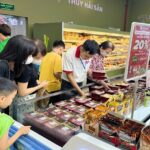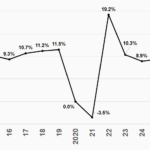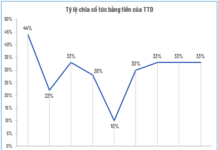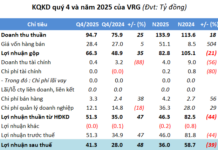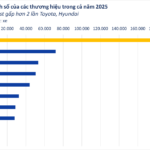At numerous economic conferences, experts and regulators have emphasized that stimulating domestic market demand will be the key driver to sustain economic recovery and drive growth in the coming period.
Boosting Consumer Spending: A Critical Catalyst for Growth
A significant highlight in the government’s stimulus efforts is the additional 2% reduction in the Value-Added Tax (VAT), from 10% to 8%, applicable to essential goods and services from July 1, 2025, through the end of 2026. This move directly supports purchasing power, particularly for middle- and low-income groups, who are heavily impacted by rising living costs. Simultaneously, it helps businesses reduce operational costs, enabling them to expand production and maintain competitive pricing.
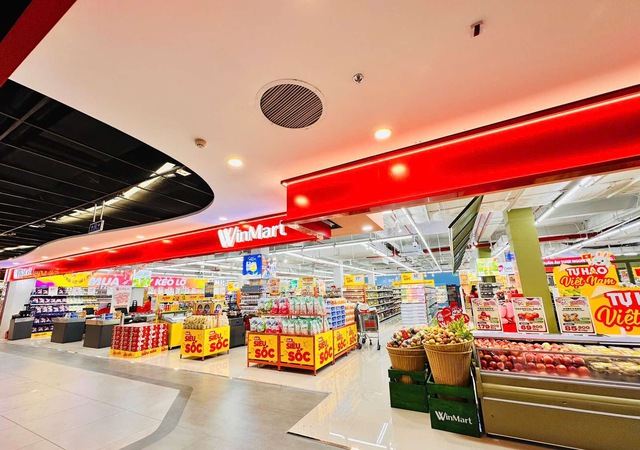
The expected ripple effect is substantial: with reduced VAT, essential consumption costs will ease, boosting shopping demand during peak seasons and extending into 2026. As consumption accounts for over 60% of Vietnam’s GDP, this stimulus will create a vital economic cycle. It’s not just a short-term solution but also a step toward sustainable growth driven by domestic purchasing power.
For the retail sector, the VAT reduction makes essential goods more affordable, encouraging consumers to shop more at modern channels like supermarkets, convenience stores, and e-commerce platforms. This presents an opportunity for large retail chains to expand their market share, especially in rural areas, where over 60% of the population resides and growth potential remains high. Customer traffic and average basket values are expected to improve significantly, driving rapid expansion for modern retail chains.
For the Fast-Moving Consumer Goods (FMCG) sector, the VAT reduction allows essential products like food, beverages, spices, and convenience items to reach consumers at better prices. This is crucial in boosting purchasing power amid high living costs. Given the high consumption frequency, the FMCG sector could see notable volume growth, while also creating opportunities for businesses to promote premium, safe, and traceable products.
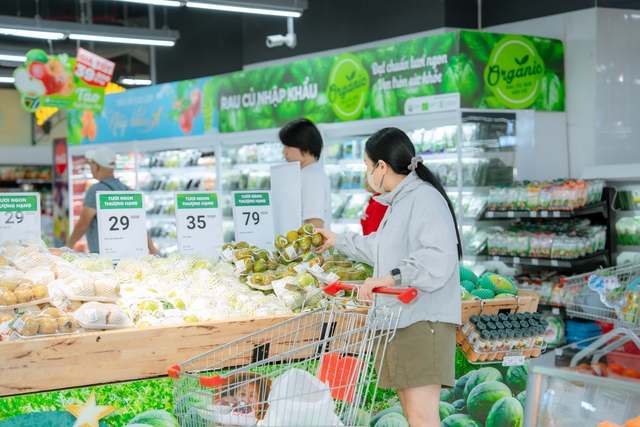
Beyond “tax reduction to boost demand,” the government is implementing synchronized measures: enhancing trade promotion, encouraging Vietnamese products to win over domestic consumers, fostering e-commerce and modern retail chains, and tightening control over counterfeit and substandard goods to ensure a fair playing field. These efforts aim to improve both the quantity and quality of consumption, linking it to safe and traceable products.
With a population of 100 million and per capita income approaching $5,000, stimulating consumer demand becomes a critical catalyst: it sustains short-term growth while reshaping market structures, creating opportunities for domestically integrated businesses to achieve sustainable development.
In this landscape, integrated consumer-retail enterprises like Masan, with an ecosystem spanning production to distribution, are poised to directly benefit from the stimulus policy and accelerate growth in the coming period.
Projected Profit Growth of Over 80% Year-on-Year
According to the latest VDSC report, Masan’s (HoSE: MSN) after-tax profit in Q3/2025 is estimated at 1,272 billion VND, up 81.4% year-on-year. Recent positive figures also hint at promising results in the final months of the year.
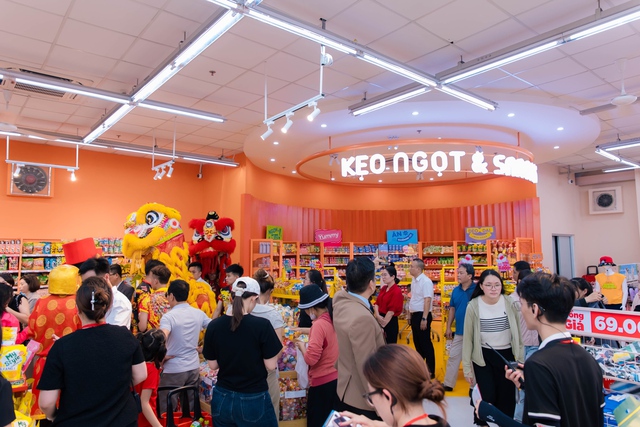
Masan’s retail arm, WinCommerce (WCM), operates the WinMart supermarket chain and WinMart+/WiN convenience stores with over 4,200 outlets nationwide, 75% of which are newly opened in rural areas. In the first eight months, WCM recorded revenue of over 25,000 billion VND, up 16.1% year-on-year and surpassing the annual growth plan. In August alone, revenue reached 3,573 billion VND, up 24.2% year-on-year, reflecting the strong rebound in domestic purchasing power and the effectiveness of the modern retail model.
Meanwhile, Masan MEATLife (MML) in the meat segment demonstrated sustainable progress post-restructuring. In August 2025, MML sold 14,007 tons of products, up 12.9% year-on-year. Revenue reached 999 billion VND (+11.1%), while after-tax profit surged 60.5% to 35 billion VND. Both EBIT and EBITDA improved significantly, indicating strengthened operational efficiency and profit margins. These results reflect the shift toward branded, safe, and traceable meat products among consumers.
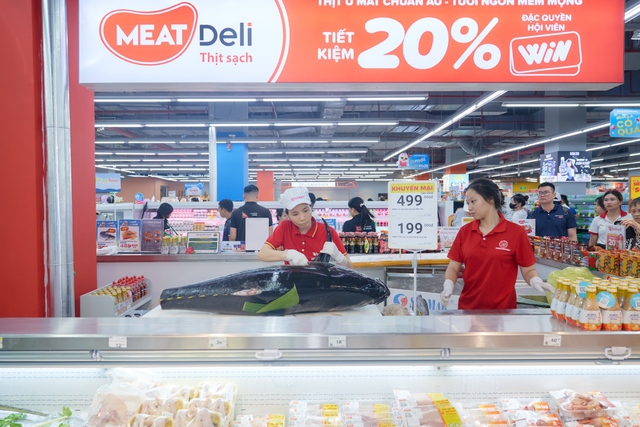
These figures show that as the stimulus policy unlocks purchasing power, domestically integrated enterprises like Masan are not only leveraging their extensive reach and product portfolio but also accelerating expansion, enhancing efficiency, and pursuing sustainable growth.
In the September 2025 update, Bao Viet Securities (BVSC) maintained an OUTPERFORM rating, significantly higher than the current market price. However, BVSC noted challenges such as intensifying competition between domestic and foreign retail chains, volatile raw material and operational costs, and new regulatory requirements like electronic invoicing, which could pose short-term pressures. This requires MSN to balance expansion with operational optimization and risk management to realize growth projections.
Unlocking Business Opportunities: How Government Stimulus Boosts Consumer Spending
Amidst a volatile global economic landscape, the Vietnamese government is strategically prioritizing domestic consumption as the cornerstone of its growth agenda. At numerous economic forums, experts and policymakers have consistently emphasized that stimulating the domestic market will serve as the pivotal driver to sustain economic recovery and achieve breakthrough momentum in the upcoming period.
Vietnam’s Affordable, Nutritious Delicacy Captivates China, EU, and the World, Generating Over $200 Million in Revenue Since Early 2023
Vietnam’s exports of this product to the EU have skyrocketed, boasting a remarkable 60% growth rate.
Tobacco Industry’s Decline: Experts Propose Recovery Strategies for Vietnam’s Once-Lucrative Sector
Recently, the Vietnam Beer-Alcohol-Beverage Association (VBA) chaired and collaborated with the Vietnam Chamber of Commerce and Industry (VCCI) and the Vietnam Association of Foreign Invested Enterprises (VAFIE) to organize a seminar titled: “Stimulating Consumption to Drive Economic Growth – Perspectives from the Beverage Industry.”
Brighter Consumer Spending Outlook Anticipated by Year-End
The consumer market outlook for the final quarter of the year appears promising. A survey conducted by UOB Bank reveals that Vietnamese consumers are optimistic about purchasing big-ticket items. Representatives from the VCBF Fund anticipate that the appreciating asset market will further boost consumer confidence.
The Evolution of Vietnam’s Meat Industry: Embracing Modernization and Changing Consumer Trends
According to Cimigo, 61% of consumers are embracing healthier diets, with 72% willing to pay a premium for VietGAP or Organic certified products. This presents a unique opportunity for the branded processed meat industry, as the confluence of the “eat well, live well” trend and the expansion of modern retail channels opens up new avenues for growth.

